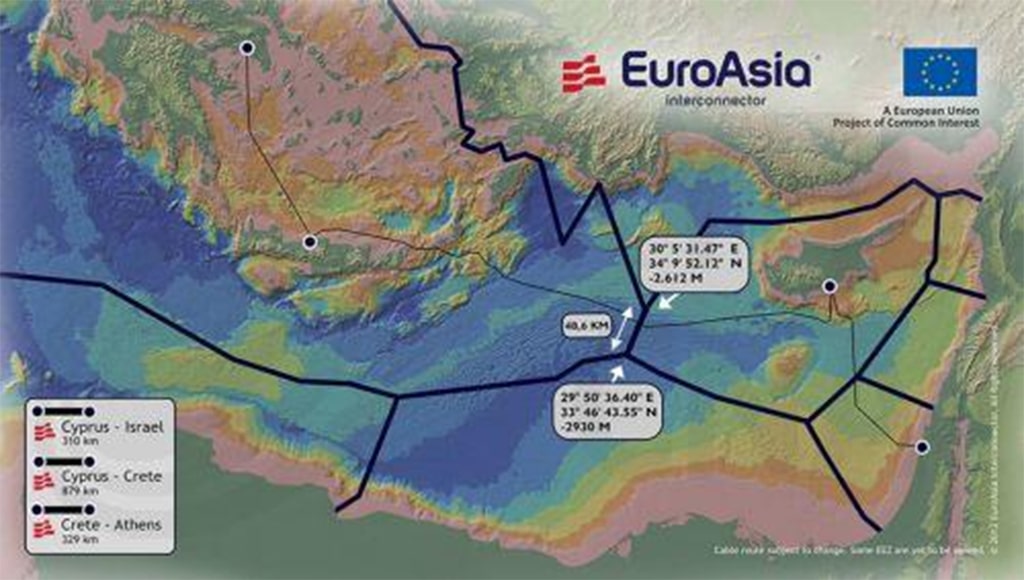The audit service has undertaken an examination of the feasibility of the EuroAsia Interconnector project, it emerged on Thursday.
Speaking on CyBC’s morning programme, the spokesman for the audit service Marios Petrides said that legislated checks must be in place wherever public taxpayer money is being spent.
Acknowledging that the deal was, up until recently, a private one, Petrides went through pains to explain that the service obviously is not auditing or meddling with the companies involved.
However, since monies are now being earmarked for the project from the Recovery and Resilience Fund (RRF) the service has a duty to evaluate and monitor this activity, the spokesman said.
In January 2022 the European Commission approved €657 million under the Connecting Europe Facility (CEF) for the project. This was followed by the granting of an additional €100 million through the Cyprus Recovery and Resilience Plan, part of the EU RRF.
“If the recently proposed €100 million from the RRF is indeed to be given toward the project’s budget, the question must be asked and answered as to why the particular company, as opposed to any other, will be in receipt of the funds,” Petrides told the state broadcaster, without this implying any illegal activity a priori.
Other questions to be reviewed are whether the project meets the specified criteria for such funding and whether the evaluation of criteria was carried out correctly.
The entire project had been estimated to amount to a two billion affair “and a state-private company deal of such magnitude must be scrutinised to ensure proper procedures are in place,” Petrides explained.
“It needs to be clarified whether the state intends to participate as a partial financer, as a guarantor of loans, or as a shareholder, having a say in decision-making regarding the project,” he added.
Asked why the need for involvement since the EU Commission had greenlit the deal, Petrides said that the EU Commission’s decision was also subject to review by the auditing services of the three countries involved, (Cyprus, Greece and Israel), as well as by the European Court of Auditors (ECA).
Not all of the €657 million had been paid out, the spokesman went on to say, but it had been approved and some advance monies must have been paid to secure the deal between the EuroAsia Interconnector and Nexans, the company slated to install the project’s subsea cables.
The audit service spokesman added that the first step of the check would involve addressing the project’s overall feasibility with the energy minister, followed by obtaining an exact inventory on how the proposed €100 million from the RRF is to be used.
Petrides also sought to point out that the Cyprus energy regulatory authority (CERA/Raek) had categorised the project as a regulated activity and therefore the public could expect to see a charge for “cable installation” on electricity bills.
EuroAsia Interconnector, for its part, issued an announcement later on Thursday, pledging “full cooperation with the audit office.”
In its announcement, the company said, it had sent a letter to the audit office to clarify issues raised and was “adhering to principles of transparency.”
It added: “After the recent signing of the contract for the construction of the submarine cables, the Project Promoter together with its financial advisors are proceeding with the completion of the financing according to the financial plan.
“In addition to the European grant that has been secured and the private funds after the expression of participation by the Independent Power Transmission Operator of Greece…the position of the European Investment Bank is expected, based on which the rest of the financing procedures from other financial institutions will be finalised.”
Regarding reports about possible involvement of the Cypriot state in the project, the statement read:
“It is clarified that the participation of the Cypriot government, as a shareholder, is not a factor in completing the financing of the project and was not included in the financial plan submitted by the Project Promoter.
“The reference to the potential granting of state guarantees, if and when needed, arose from the possible financing of the project by the European Investment Bank, which in similar cases has been granted a state guarantee for the granting of a loan,” the company’s statement said.






Click here to change your cookie preferences